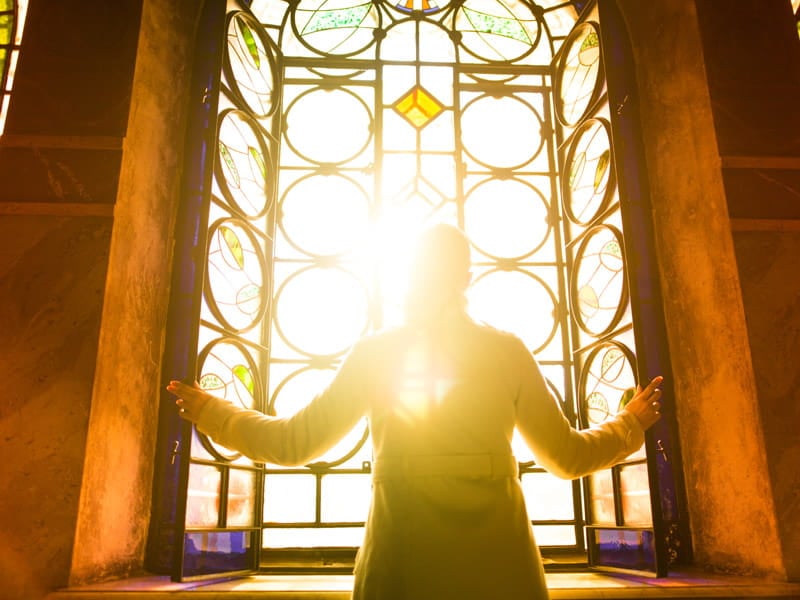595 Among the religious authorities of Jerusalem, not only were the Pharisee Nicodemus and the prominent Joseph of Arimathea both secret disciples of Jesus, but there was also long-standing dissension about him, so much so that St. John says of these authorities on the very eve of Christ's Passion, "many.. . believed in him", though very imperfectly.[378] This is not surprising, if one recalls that on the day after Pentecost "a great many of the priests were obedient to the faith" and "some believers. . . belonged to the party of the Pharisees", to the point that St. James could tell St. Paul, "How many thousands there are among the Jews of those who have believed; and they are all zealous for the Law."[379]
596 The religious authorities in Jerusalem were not unanimous about what stance to take towards Jesus.[380] The Pharisees threatened to excommunicate his followers.[381] To those who feared that "everyone will believe in him, and the Romans will come and destroy both our holy place and our nation", the high priest Caiaphas replied by prophesying: "It is expedient for you that one man should die for the people, and that the whole nation should not perish."[382] The Sanhedrin, having declared Jesus deserving of death as a blasphemer but having lost the right to put anyone to death, hands him over to the Romans, accusing him of political revolt, a charge that puts him in the same category as Barabbas who had been accused of sedition.[383] The chief priests also threatened Pilate politically so that he would condemn Jesus to death.[384]
Jews are not collectively responsible for Jesus' death
597 The historical complexity of Jesus' trial is apparent in the Gospel accounts. The personal sin of the participants (Judas, the Sanhedrin, Pilate) is known to God alone. Hence we cannot lay responsibility for the trial on the Jews in Jerusalem as a whole, despite the outcry of a manipulated crowd and the global reproaches contained in the apostles' calls to conversion after Pentecost.[385] Jesus himself, in forgiving them on the cross, and Peter in following suit, both accept "the ignorance" of the Jews of Jerusalem and even of their leaders.[386] Still less can we extend responsibility to other Jews of different times and places, based merely on the crowd's cry: "His blood be on us and on our children!", a formula for ratifying a judicial sentence.[387] As the Church declared at the Second Vatican Council: . . . neither all Jews indiscriminately at that time, nor Jews today, can be charged with the crimes committed during his Passion. . . the Jews should not be spoken of as rejected or accursed as if this followed from holy Scripture.[388]
597 The historical complexity of Jesus' trial is apparent in the Gospel accounts. The personal sin of the participants (Judas, the Sanhedrin, Pilate) is known to God alone. Hence we cannot lay responsibility for the trial on the Jews in Jerusalem as a whole, despite the outcry of a manipulated crowd and the global reproaches contained in the apostles' calls to conversion after Pentecost.[385] Jesus himself, in forgiving them on the cross, and Peter in following suit, both accept "the ignorance" of the Jews of Jerusalem and even of their leaders.[386] Still less can we extend responsibility to other Jews of different times and places, based merely on the crowd's cry: "His blood be on us and on our children!", a formula for ratifying a judicial sentence.[387] As the Church declared at the Second Vatican Council: . . . neither all Jews indiscriminately at that time, nor Jews today, can be charged with the crimes committed during his Passion. . . the Jews should not be spoken of as rejected or accursed as if this followed from holy Scripture.[388]
All sinners were the authors of Christ's Passion
598 In her Magisterial teaching of the faith and in the witness of her saints, the Church has never forgotten that "sinners were the authors and the ministers of all the sufferings that the divine Redeemer endured."[389] Taking into account the fact that our sins affect Christ himself,[390] the Church does not hesitate to impute to Christians the gravest responsibility for the torments inflicted upon Jesus, a responsibility with which they have all too often burdened the Jews alone:
We must regard as guilty all those who continue to relapse into their sins. Since our sins made the Lord Christ suffer the torment of the cross, those who plunge themselves into disorders and crimes crucify the Son of God anew in their hearts (for he is in them) and hold him up to contempt. And it can be seen that our crime in this case is greater in us than in the Jews. As for them, according to the witness of the Apostle, "None of the rulers of this age understood this; for if they had, they would not have crucified the Lord of glory." We, however, profess to know him. And when we deny him by our deeds, we in some way seem to lay violent hands on him.[391] Nor did demons crucify him; it is you who have crucified him and crucify him still, when you delight in your vices and sins.[392]

